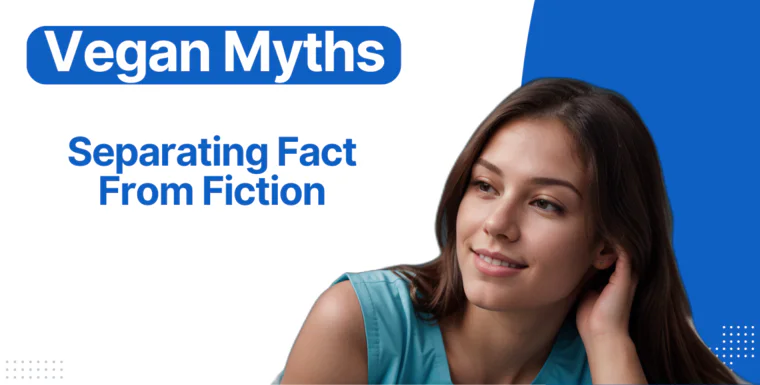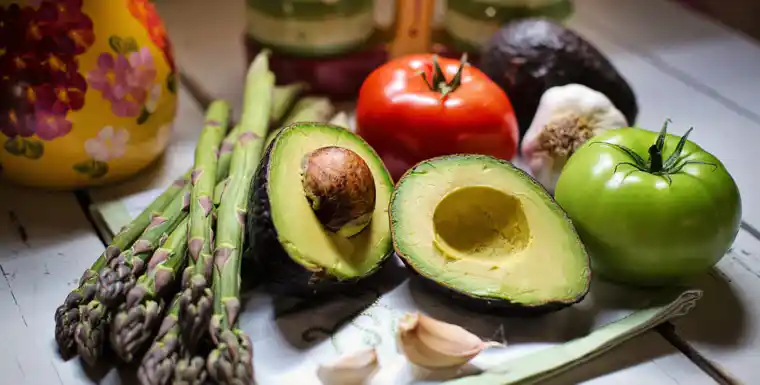Are you considering embracing the vegan lifestyle but find yourself deterred by persistent vegan myths and misconceptions? Do you wish to enhance your health and contribute to animal welfare, but not quite sure how a plant-based diet can help? You’ve come to the right place!

We’re here to debunk these myths and arm you with vegan facts that enable you to make informed decisions. Whether it’s concerns about vegan nutrition, doubts about the vegan health benefits, or questions about the environmental impact of veganism, we’ve got you covered.
Through this exploration, you’ll understand how veganism and health go hand in hand, how it plays a crucial role in animal rights, and its profound impact on sustainable living. So, are you ready to unearth the truth behind the myths of veganism? Let’s dive in!
Quick Links
1) Vegans Don’t Get Enough Protein – Busting the Protein Deficiency Myth

Understanding the Origins of the Myth
One of the most common misconceptions about veganism is that a plant-based diet lacks sufficient protein. This myth has been perpetuated over the years, creating a false association between vegan nutritional deficiencies and the consumption of plant-based foods.
High-Protein Vegan Food Sources
Firstly, it’s essential to understand that protein is not exclusive to animal-based products. Many plant-based foods are high in protein, such as lentils, chickpeas, quinoa, almonds, tofu, and chia seeds. Incorporating these into your diet can ensure that you’re meeting your daily protein requirements without any animal-derived products.
Here’s a quick overview of the protein content of some popular vegan foods:
| Source | Protein per 100g | Protein per Cup | Calories per 100g |
|---|---|---|---|
| Lentils (Cooked) | 9g | 18g | 116 kcal |
| Chickpeas (Cooked) | 9g | 15g | 164 kcal |
| Quinoa (Cooked) | 4.1g | 8.1g | 120 kcal |
| Almonds | 21.1g | 30g | 579 kcal |
| Tofu (Firm) | 8g | 20g | 144 kcal |
| Chia Seeds | 16.5g | 24.69g | 486 kcal |
Debunking the Myth with Scientific Evidence
Numerous scientific studies endorse the adequacy of protein intake among vegans. For instance, a balanced vegan diet can provide all essential amino acids, which are the building blocks of protein, debunking the vegan protein myth once and for all.
Benefits of Protein from Plant-Based Sources
Plant-based proteins offer additional health benefits beyond merely supplying our protein needs. They are often rich in fiber, antioxidants, and phytonutrients, and low in saturated fat and cholesterol. This combination can support heart health, promote good digestive health, and provide protection against various diseases. So, veganism and health are not contradictory, but they can be complementary when the diet is well-planned and balanced.
2) Vegans Are Deficient in Calcium – Unraveling the Calcium Myth
Unearthing the Origins of the Myth
The idea that vegans are deficient in calcium is another widely spread myth. This misconception often arises from the belief that dairy products are the only reliable source of calcium. In fact, there are many plant-based sources of calcium.
Rich Calcium Sources in a Vegan Diet
Vegan-friendly foods such as fortified plant milk, tofu prepared with calcium sulfate, dark leafy greens like kale and bok choy, and almonds are all excellent sources of calcium. Incorporating these foods into your meals can help ensure that your daily calcium needs are met.
Debunking the Myth with Scientific Evidence
Research has shown that a vegan diet can supply adequate calcium for all stages of life when planned appropriately. Interestingly, countries with the highest dairy consumption also have the highest rates of osteoporosis, suggesting that dairy is not the end-all and be-all of bone health.
Benefits of Calcium from Plant-Based Sources
In addition to providing calcium, plant-based sources often come packed with other vital nutrients like fiber, antioxidants, and various vitamins. Moreover, plant-based sources of calcium are often low in saturated fat and devoid of cholesterol, which can support overall heart health.
So, not only can a well-planned vegan diet meet all your calcium needs, but it can also provide a bounty of other health benefits, further highlighting the harmonious relationship between veganism and health.
3) Veganism Is Only for Hippies and Tree Huggers – Dissecting Stereotypes

Understanding the Origins of the Stereotype
The image of vegans as being only “hippies” or “tree huggers” is a stereotype that has been perpetuated for many years. This image often misrepresents the diverse group of individuals who adopt a vegan lifestyle for a variety of reasons, from health to ethics, to environmental concerns.
Diversity Within the Vegan Community
Veganism is embraced by people from all walks of life. This includes professionals from various fields, athletes who require optimal nutrition for performance, celebrities who utilize their platform to advocate for animal rights, and everyday people who are making conscious choices for personal and planetary health. The vegan community is as diverse as it is vibrant!
Debunking the Stereotype with Real-Life Examples
Many high-profile athletes and celebrities endorse the benefits of a plant-based diet. For instance, Venus Williams, a top-tier professional tennis player, credits a vegan diet for helping her manage an autoimmune disease. Joaquin Phoenix, an Academy Award-winning actor, is a long-time vegan who actively champions for animal rights.
Veganism and Social Justice: More Than Just a Diet
Importantly, veganism is not just a dietary choice; it’s a lifestyle committed to reducing harm and promoting more sustainable and ethical practices. This lifestyle intersects with social justice issues, including animal welfare, food security, and environmental sustainability. It’s clear that veganism extends far beyond the outdated hippie stereotype.
4) Veganism Is Expensive – Evaluating the True Costs
A widespread misconception about veganism is that it’s an expensive lifestyle, reserved only for those who can afford high-end, specialty vegan products. This perception often stems from the visibility and marketing of branded vegan substitutes, such as plant-based meat alternatives.
Affordable Vegan Options – A Budget-friendly Plant-based Diet
In reality, some of the most nutritious and staple foods in a vegan diet—such as rice, beans, lentils, fruits, and vegetables—are generally affordable and accessible. Bulk shopping, seasonal produce, and locally sourced foods can further lower the cost of a vegan diet.
Moreover, embracing a vegan lifestyle doesn’t mean you’re confined to obscure or boring meals. Among many others, the popular bestselling vegan cookbook, “Thug Kitchen”, can help you explore a universe of inventive, delectable, and budget-friendly recipes. With over 15,000 rave reviews, this cookbook guides you in creating fantastic meals using inexpensive ingredients, truly demonstrating that a vegan diet can be both economical and satisfying.
Comparing the Costs – Vegan vs Non-Vegan Diet
When evaluating the cost, it’s also crucial to consider the potential health benefits and cost savings from reduced medical expenses in the long run. Research suggests that a plant-based diet can help prevent, manage, or even reverse certain chronic diseases, potentially saving on healthcare costs.
Moreover, veganism and food security are closely linked. Shifting towards plant-based diets can contribute to global food sustainability by reducing the resources required for animal agriculture, thus debunking the myth of veganism being expensive both for individuals and the planet.

5) Veganism Is a Fad Diet – Understanding the Longevity of Veganism
The Myth: Veganism as a Trendy Diet
Another common misconception portrays veganism as a fad diet, linking it with fleeting weight loss schemes or stylish food trends. This viewpoint obscures the true essence of veganism—a lifestyle choice rooted in ethical, environmental, and health considerations.
The Reality: Plant-based Diet for Sustained Health
Plant-based diets are backed by scientific evidence, showing their role in sustained weight management and overall health. However, veganism isn’t solely about weight loss. It’s a comprehensive approach to nourishing the body with wholesome foods, practicing compassion towards animals, and endorsing sustainable living.
The Longevity of Veganism: More Than a Passing Phase
Contrary to the notion of it being a trendy diet, vegan principles have found a place in various cultures and societies worldwide for centuries, demonstrating veganism’s longevity. This is not a fleeting trend but a sustainable lifestyle choice impacting our health, animal welfare, and the environment.
Veganism and Ethics: Toward a Mindful Consumption
The ethics of veganism steer individuals toward mindful consumption, fostering healthier eating habits and respect for all living beings. Looking ahead, the future of veganism seems promising as more individuals align their dietary choices with their values, seeing the benefits of a plant-based diet and making it a long-term commitment.
Bonus Myth! Vegan Food Is Not Tasty – Unveiling the Richness of Vegan Cuisine

Myth: Vegan Food Is Bland
A common deterrent for people considering a switch to a plant-based diet is the belief that vegan food lacks flavor and is generally unappetizing. However, this is far from the truth and is one of the many vegan myths that needs debunking.
Reality: The Diversity of Vegan Cuisine
The vegan culinary world is as varied and flavorful as any other. With a plethora of fruits, vegetables, grains, legumes, nuts, and seeds at your disposal, the opportunities for creating nutritious and delectable meals are limitless. An abundance of vegan recipes online and the increasing number of vegan restaurants globally attest to the popularity and palatability of vegan food.
Experimenting with Vegan Flavors
Incorporating a diverse range of foods not only ensures a broad spectrum of nutrients but also exposes you to an exciting array of tastes and textures. The joy of vegan cooking lies in experimenting with different ingredients, flavors, and cuisines, leading you to discover your favorite plant-based dishes.
Conclusion – Towards a Compassionate and Sustainable Lifestyle
Recap: Unraveling the Vegan Misconceptions
From myths around protein and calcium deficiencies to stereotypes and cost concerns, we’ve debunked some of the most stubborn misconceptions about veganism. Veganism extends beyond mere dietary choices; it opens up a world of plant-based nutrition, advocates for animal welfare, encourages sustainable living, and promotes a compassionate lifestyle.
Veganism and Its Multifaceted Impact
Veganism’s health benefits, environmental considerations, social justice implications, and animal rights are closely interwoven. It fosters respect for all life and recognizes the power of individual choices in crafting a sustainable, equitable world.
Ethical and Healthy Living: It’s a Spectrum
Balance and compassion are core values at Body Mind Better, and our approach here is no exception. It’s important to recognize that healthy and ethical eating practices exist across a wide range, including diets based on animal and dairy products. Veganism doesn’t have to be an aggressive, all-or-nothing proposition. We believe that by offering informed choices and fostering open dialogue, we can help create a more inclusive and sustainable food culture for everyone.
Your Unique Journey Towards Veganism
This exploration of vegan facts aims to shed light on the truths behind the myths of veganism. Equipped with this knowledge, we encourage you to dig deeper into the advantages of a plant-based diet and perhaps contemplate making the switch. Remember, the journey towards veganism is unique for everyone, and every small step matters. Here’s to making choices that resonate with your values and contribute to a healthier you and a more sustainable world.





